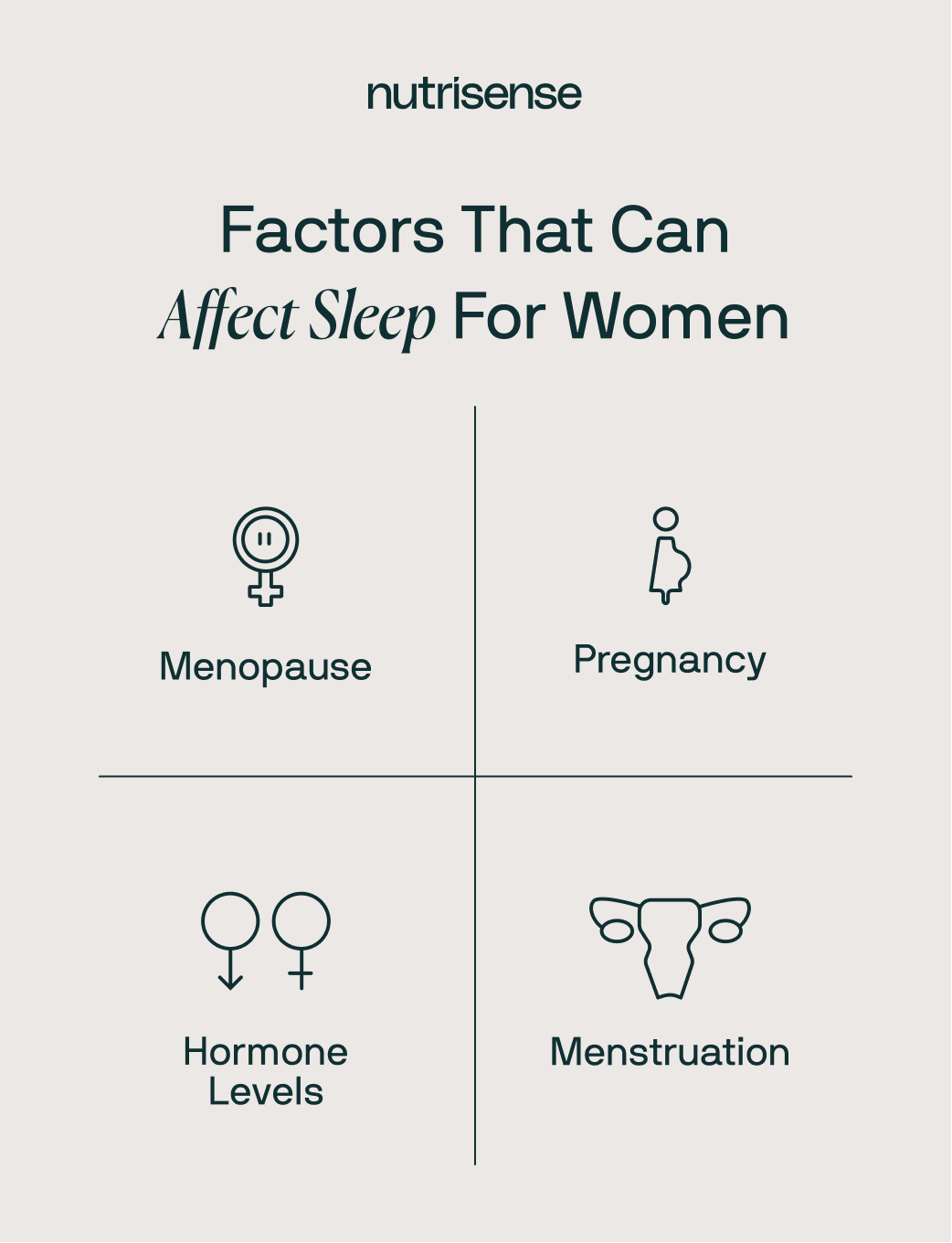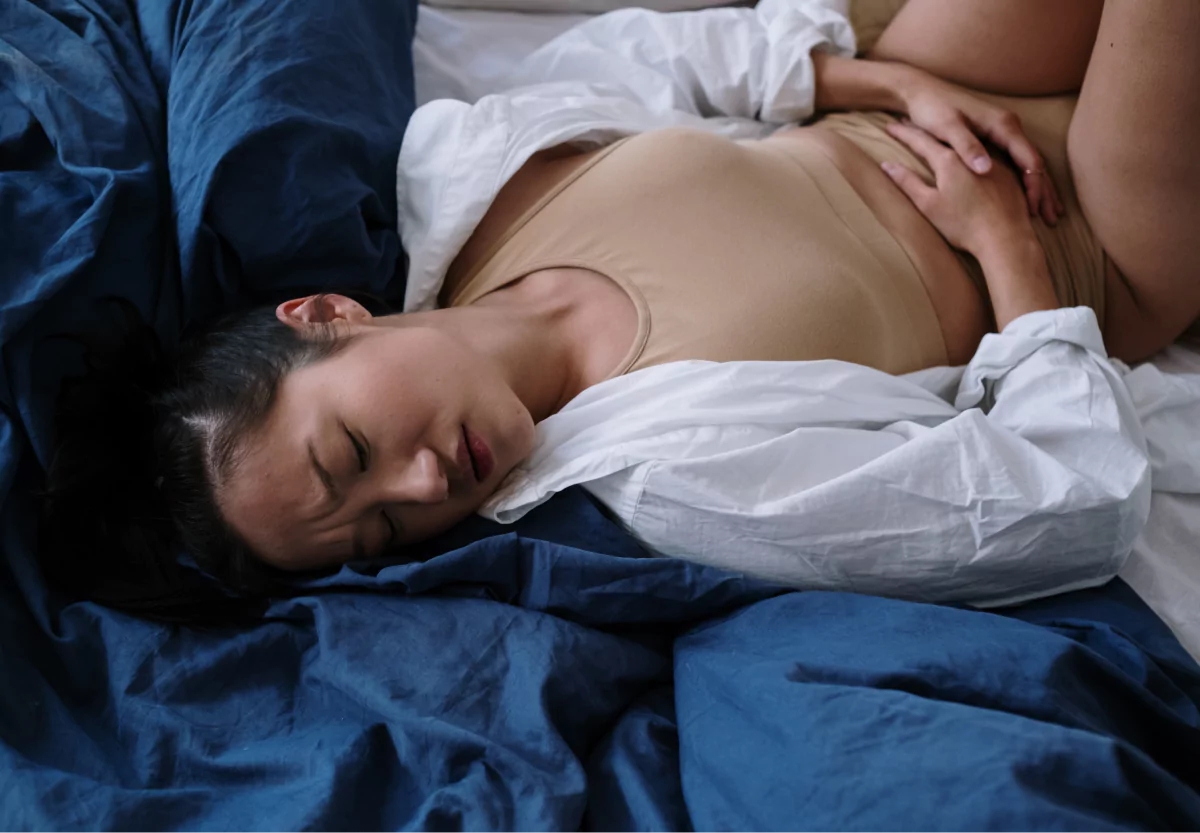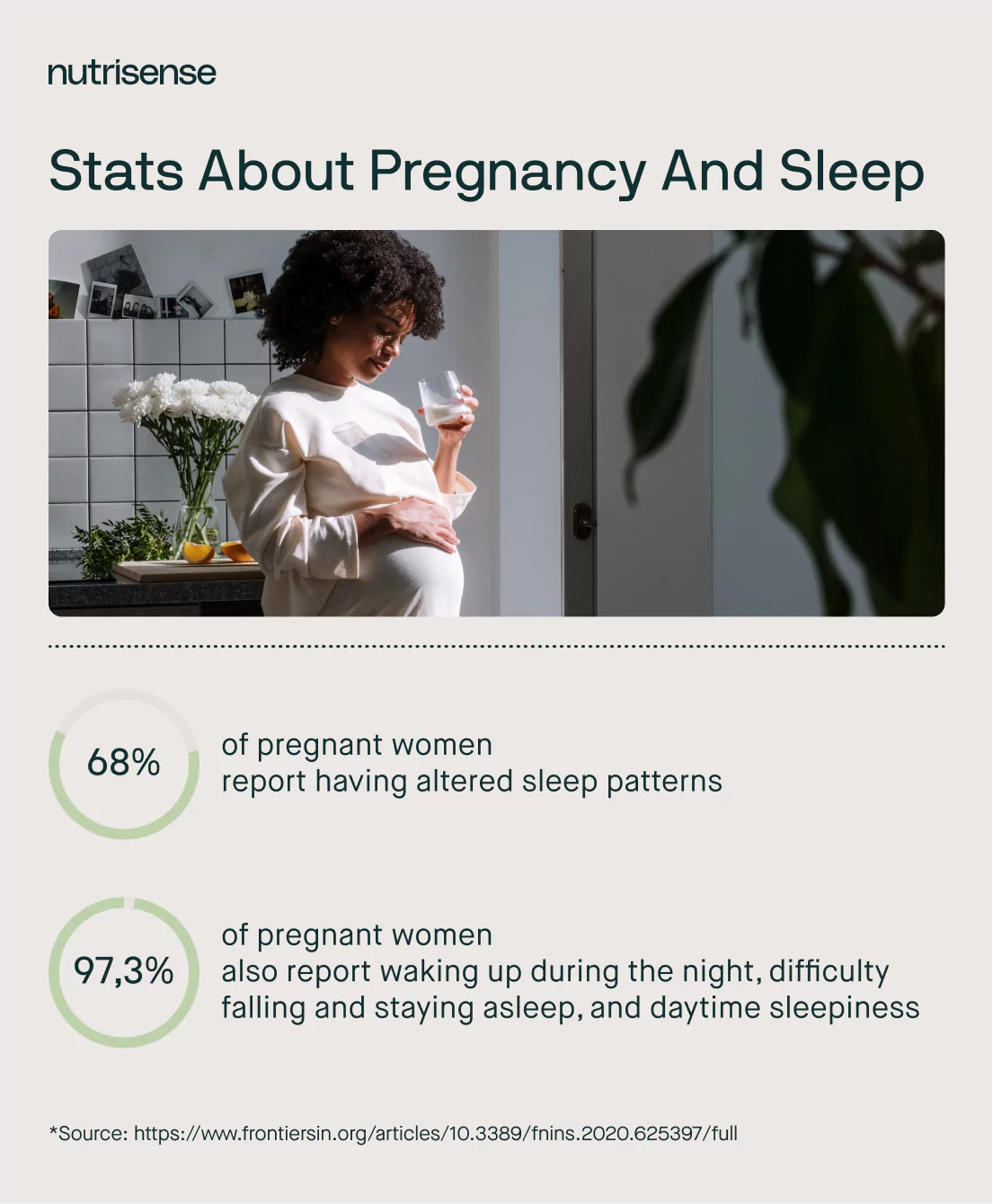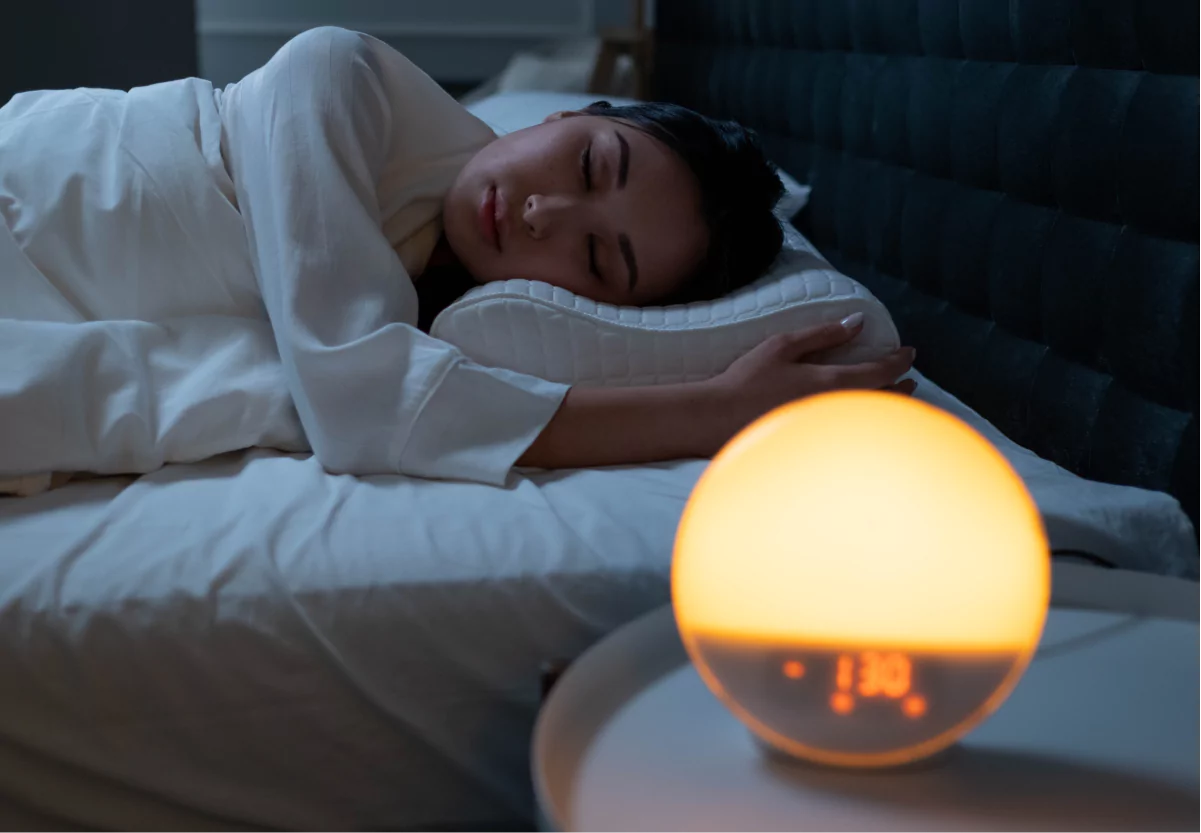Do Women Need More Sleep Than Men? 7 Reasons and How Much You Need

Key Takeaways
- Duration: On average, women need between seven and nine hours of sleep per night to support metabolic health.
- Biological Factors: Hormonal shifts during the menstrual cycle, pregnancy, and menopause significantly increase sleep requirements and can disrupt sleep architecture.
- Brain Activity: Higher rates of multitasking lead to more intensive brain energy expenditure during the day, requiring longer recovery times at night.
- Metabolic Impact: Inadequate sleep directly impairs glucose regulation and insulin sensitivity, making quality rest a pillar of metabolic training.
- Duration: On average, women need between seven and nine hours of sleep per night to support metabolic health.
- Biological Factors: Hormonal shifts during the menstrual cycle, pregnancy, and menopause significantly increase sleep requirements and can disrupt sleep architecture.
- Brain Activity: Higher rates of multitasking lead to more intensive brain energy expenditure during the day, requiring longer recovery times at night.
- Metabolic Impact: Inadequate sleep directly impairs glucose regulation and insulin sensitivity, making quality rest a pillar of metabolic training.
According to the Centers for Disease Control and Prevention (CDC), all adults need at least seven hours of sleep. However, based on their 2020 sleep survey study, only 72.3 percent of the population was able to get adequate sleep, and as many as 50 to 70 million Americans suffer from chronic sleep disorders.
We know that sleep is important for overall health, but does the amount of sleep men and women need vary? The answer is more complicated than a simple yes or no.
A lack of sleep can affect your mental health, glucose regulation, energy levels, and overall wellness. So, getting enough sleep for your unique body is critical.
While there is little evidence to suggest that all women need more sleep than men, some research does suggest that women could benefit from some more shut-eye. Certain factors affecting some women may cause them to need more sleep or be at higher risk of not meeting their sleep needs.
Read on to learn more about a few factors that impact women's health and sleep needs, plus get a few tips for better sleep.
Why Might Women Need More Sleep than Men?
Yes, biological and neurological factors often mean women require more sleep than men. Research indicates that because women’s brains are wired for multitasking, they expend more energy during waking hours, necessitating a longer recovery period. Additionally, the complex interplay of glucose levels and sex hormones creates unique metabolic demands that men do not experience. Key drivers include:
- Hormones
- Menstruation
- Pregnancy
- Gender Differences in the Circadian Cycle
- Medical Conditions
But before we get into the details, remember that experiencing disrupted sleep or irregular sleep patterns due to these factors doesn't necessarily mean that all women need more or longer sleep—or that they all need the same amount. It's more about finding what works best for you, but when in doubt, consult a healthcare provider.
Here are a few of the factors that may affect women's sleep:

Why Do Girls Need More Sleep? Differences in Brain Activity
According to a study by Loughborough University's Sleep Research Center, women typically multitask throughout the day. That translates to increased brain activity, more energy spent, and a greater need for restful sleep. Compared to men, women, on average, have higher levels of brain activity during the day. They also seem to have slightly different sleep characteristics than men—women often fall asleep much faster at night.
However, faster isn't always better. While women may fall asleep quicker, they also tend to wake up more often throughout the night than men. This can be why women need more hours per night to feel fully rested and lead a healthy life.
Hormone Levels
There's a lot of evidence that suggests women's sex hormones, including estrogen and progesterone, can impact their sleep. Research shows that sleep disturbances in women are most pronounced during periods of life characterized by changes in hormone levels.
For example, young women experience a surge of hormonal changes during puberty. During this time, they're almost 50 percent more likely than adolescent boys to develop insomnia.
Women also show different sleep architecture (the basic structural organization of normal sleep) during different stages of their ovulation cycles, which correspond to changes in hormone levels.
Some women experience changes in the length and quality of sleep cycle phases like NREM (non-rapid eye movement) and REM (rapid eye movement) deep sleep during different stages of their lives, characterized by hormonal changes. These include menstruation, ovulation, pregnancy, and menopause.
Menstrual Cycle

Research has found that changes in sleep architecture occur during the different phases of the menstrual cycle. A regular menstrual cycle occurs in two main phases: the follicular phase and the luteal phase.
Most sleep disturbances during the menstrual cycle occur during the luteal phase, characterized by a rise in progesterone levels after ovulation before a sharp decline ahead of menstruation. During this phase, some women experience:
- Increased sleep-onset insomnia and sleep deprivation
- Frequent instances of waking up mid-sleep cycle
- Lower sleep quality and efficiency
- Premenstrual syndrome, or PMS
- More psychological distress, depressive moods, and other mental health conditions
Women experiencing PMS often suffer from more unpleasant dreams, nocturnal awakenings, morning tiredness, and increased mental activity compared to women who don't experience PMS. Women with PMS are also more likely to report insomnia, a more severe degree of sleep disruption, migraines, and excessive daytime sleepiness.
Pregnancy
Research shows that self-reported sleep issues increase during pregnancy, with 68 percent of pregnant women reporting having altered sleep. The most common reasons include an increase in urinary frequency, headaches, and leg cramps.
Some pregnant women also reported sleep apnea, back pain, frequent nighttime urination, and daytime sleepiness, all of which increased as pregnancy progressed. Almost half of all pregnant women also report an increase in symptoms of obstructive sleep apnea, such as snoring.

Many of these effects on sleep may be attributed to physical changes during pregnancy, like increased abdominal mass, movement of the fetus, and more. Other sleep problems occurring after birth, such as increased wake time, decreased REM duration, and decreased sleep efficiency, may be related to the care and feeding of newborns.
Menopause
Menopause is the natural biological process that marks the end of a woman's menstrual cycle. Menopause typically happens in your 40s or 50s, with the average age of menopause in the U.S. being 51.
During menopause, estrogen, progesterone, and estradiol levels begin to fall, leading to changes in the body, which can affect your sleep. In fact, postmenopausal women have the highest rate of insomnia complaints in the general U.S. population.
Some women (about 80 percent) experience vasomotor symptoms during menopause, such as hot flashes and night sweats. These symptoms are associated with poorer self-reported sleep quality and chronic insomnia.
Some sleep studies show that women with hot flashes tend to wake up more often. Other studies suggest that some of these sleep issues, like more frequent nighttime awakenings and trouble falling asleep, could be caused by decreasing estrogen and estradiol levels.
Other Sleep Disruptors

Other Sleep Disruptors
Beyond factors such as hormonal changes, pregnancy, and menopause, there are quite many differences in sleep disorders between women and men. In fact, according to one study, women are:
- 41 percent more likely to experience insomnia than men
- Twice as likely to experience restless leg syndrome
- More likely than men to report having trouble staying asleep, feeling unrefreshed in the morning, and excessive daytime sleepiness.
- More likely than men to be diagnosed with anxiety and major depression
These disorders have a bidirectional relationship with insomnia, meaning that anxiety and depression may be linked to this condition. However, studies have shown that differences in sleep problems for women and men remain even after controlling for psychological issues.
How Many Hours of Sleep Do Women Need?
According to the U.S. Department of Health, women should get between seven and nine hours of sleep per night. Women in earlier life course stages and those who are pregnant may need more sleep, and older people may need less sleep.
Talk to your doctor about the right amount of sleep for you since other factors, such as age and activity levels, can also affect your sleep requirements.
6 Tips to Improve Your Quality of Sleep
If you struggle with sleep issues and getting enough sleep, it's important to consult with your doctor. In the meantime, you can implement a few easy adjustments at home.
Here are some tips on healthy sleep habits to help you achieve a restful night. In general, by adopting more positive attitudes about sleep and ensuring you're getting enough, you'll be making the best decisions for your future health.
1) Maintain a Regular Bedtime
An irregular bedtime schedule has been shown to interfere with sleep quality. Establishing a consistent sleep schedule may benefit your circadian rhythm and improve your sleep. You don't have to create an earlier bedtime. Whatever time works for you, stick with it.

For those who share a bedroom, setting a consistent sleep schedule can be a challenge, as everyone may have different sleep times. Try to negotiate a time that works for all parties whenever possible.
Try setting consistent sleep times for turning out the lights and getting into bed. Get up simultaneously, even on weekends, to avoid repaying your "sleep debt" with excessive sleep on those days. There are even some handy sleep apps out there that can help you stay accountable to your sleep schedule at night.
2) Examine Your Eating Habits
The food you eat may affect your quality of sleep. As a general rule, it can be a good idea to avoid eating at least three hours before bedtime. But for some people, what you eat may be even more important than when.
For example, spicy foods can cause acid reflux, which can be worsened by lying down. These foods can also increase body temperature, which is linked to poor sleep quality.
Foods containing added sugar and refined carbs, like sodas, instant noodles, fast foods, and desserts, have also been shown to interfere with sleep quality. A high intake of trans fats and calories may also contribute to insomnia, and eating fatty foods before bed has also been linked to poor sleep.
Caffeine and alcohol consumption can also influence sleep. Researchers recommend sticking to caffeine consumption in the morning to avoid sleep disruption and decrease overall amounts to tolerance. High alcohol consumption is also associated with poorer sleep quality and shorter sleep duration.
3) Create a Sleep-Conducive Environment
Your sleeping environment is a crucial component of good sleep hygiene. Here are some tips for a sleep-conducive environment:
- If you live in an area with lots of noise that causes sleep interruptions, try keeping your room quiet by blocking out noise with sleep aids, such as a fan, white noise machine, or earplugs.
- Keep your room at a comfortable temperature that isn't too hot or too cold: the ideal range is between 65 and 70 degrees Fahrenheit.
- Keep your bedroom dark when you're trying to fall asleep.
- Consider keeping pets out of the bedroom, as they can cause some sleep disruption.
4) Limit Exposure to Screens Before Bed
Research shows that using blue light-emitting screens, such as laptops, tablets, and smartphones, before bed can disrupt sleep. The blue wavelength lights these screens emit can suppress melatonin.
Melatonin is a natural hormone that helps you sleep and increases your brain's alertness. So, to make it easier to fall asleep, you may want to avoid using these screens before bedtime.
5) Avoid Poor Sleep Hygiene
Sleep hygiene is a collection of habits and conditions that affect your sleep, including those we’ve just shared above. Poor sleep hygiene can interfere with your sleep quality. Some examples of poor sleep hygiene to avoid include:
- Sleeping in a room that's too hot or too cold
- Taking frequent naps in the daytime can interfere with your ability to sleep at night
- Sleeping in a loud room
- Keeping an irregular bedtime schedule
6) Wind Down with Relaxing Activities

Relaxing activities at night can help your body wind down, ease your mind, and lead to more quality sleep. Some good relaxation activities to try include:
- Reading a book
- Taking a warm shower or bath before bed
- Meditation or breathing techniques
- Light stretching or yoga
Find the right Nutrisense programto turn insight into progress.
Find Your Ideal Sleep Time with Nutrisense
Did you know sleep and blood glucose are connected? If you didn’t, read our guide to sleep and blood sugar to learn more about the relationship! Your diet, lifestyle, and other habits play a big role in this, too.
Keeping track of and managing all of these factors is important for better sleep—and it’s crucial for overall health and wellness. Nutrisense connects you to board-certified nutritionists and registered dietitians trained to help you find your fit, sleep or otherwise, through various support options. The program also gives you access to continuous glucose monitors (CGMs) and a helpful app to track and manage key metrics like blood glucose.
Nutrisense’s glucose-certified nutritionists can help you interpret this data and provide personalized recommendations. You can identify patterns, trends, and correlations between your lifestyle, diet, and blood glucose fluctuations to understand your body's unique needs, including how much sleep you need! Take our quiz to get started.
Frequently Asked Questions About Women’s Sleep
What is the average sleep for women?
The average sleep for women should fall between seven and nine hours per night. However, during the luteal phase of the menstrual cycle (the time between ovulation and your period), many women require an additional 30 to 60 minutes of rest to maintain stable glucose regulation and optimal energy levels.
Why do girls and women generally require more sleep than men?
Biological and neurological factors often mean women require more sleep. Research suggests women’s brains engage in higher levels of multitasking, leading to greater energy expenditure. Additionally, significant hormonal shifts—starting in puberty for girls and continuing through menopause—impact sleep architecture, requiring longer recovery periods to maintain metabolic health.
How does sleep quality affect glucose levels?
Sleep is a pillar of metabolic health. Inadequate rest can lead to decreased insulin sensitivity and increased glucose variability. By prioritizing sleep, you support your body’s ability to manage carbohydrates efficiently, which is a core component of metabolic training.
How does the menstrual cycle impact a woman's sleep needs?
Hormonal shifts, particularly rising progesterone levels during the luteal phase, can increase body temperature and cause frequent nighttime awakenings. This disruption can trigger higher glucose variability, meaning your body may require extra rest during this phase to maintain metabolic stability and prevent cravings.
Can a nutritionist help me determine my ideal sleep duration?
Yes. Nutrisense Registered Dietitians use your glucose data to identify patterns between your rest and your metabolic response. By analyzing how a poor night of sleep affects your fasting glucose the next morning, a nutritionist can help you define a "sleep floor" that keeps your energy stable and your metabolism on track.
Go Beyond Glucose Data with Nutrisense
Your glucose can significantly impact how your body feels and functions. That’s why stable levels are an important factor in supporting overall wellbeing. But viewing glucose isn't enough. Nutrisense, you’ll be able to learn how to use your body's data to make informed lifestyle choices that support healthy living.
One-to-one coaching
Sign up to access insurance-covered video calls to work with a glucose expert: a personal registered dietitian or certified nutritionist who will help tailor your lifestyle and diet to your goals.
Monitor and measure what matters
With the Nutrisense CGM Program, you can monitor your glucose with health tech like glucose biosensors and continuous glucose monitor (CGM)s, and analyze the trends over time with the Nutrisense App. This will help you make the most informed choices about the foods you consume and their impact on your health.
Find your best fit
Ready to take the first step? Start with our quiz to find the right Nutrisense program to help you take control.

Liz has a Master of Science degree in Clinical Nutrition and Integrative Health and is a board-certified nutrition specialist (CNS) and a licensed dietitian nutritionist (LDN). As a nutritionist, Liz has educated and counseled 100s of clients in areas such as weight loss, hormonal imbalances, and gastrointestinal diseases.




